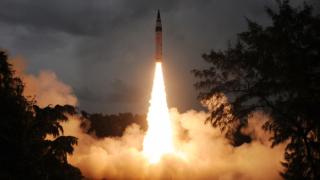Australian political leaders are under growing pressure to sign a new Treaty on the Prohibition of Nuclear Weapons.
It will be high on the agenda at the ALP national conference, since 78 per cent of Labor's federal caucus have signed a Parliamentary Pledge in support of the so-called "Ban Treaty". And the discussions today could influence future government policy.
A world without nuclear weapons is a laudable goal that the international community has sought since 1949. It's an objective the five nuclear weapons states within the 1970 Nuclear Non-proliferation Treaty (NPT) — the United States, Britain, France, Russia, and China — have formally committed to under that agreement. And it's a mission that Australia has and should continue to lead through its responsible international engagement and activism.
But it's not a goal that will be achieved by the Ban Treaty.
While the treaty aims to eliminate nuclear weapons, it is dangerously ill-equipped to do so. Its ratification would lower existing nuclear safeguards, disadvantage democratic nuclear powers, and compel US allies like Australia to give up shared national assets that contribute to global security — potentially undermining the US alliance.
As a progressive but pragmatic global citizen, Australia should work with the international community to address these risks and improve the NPT process before rushing to consider a treaty that will likely backfire.
Most nuclear countries not interested
For any treaty to eliminate nuclear weapons, all states must agree to destroy their arsenals. This includes North Korea, Pakistan, India and Israel, in addition to the NPT's five nuclear weapons states.
But none of these countries have signed the Ban Treaty and none will until global security conditions fundamentally change.
By not requiring states to sign an "additional protocol", the treaty actually reduces the International Atomic Energy Agency's (IAEA) ability to verify the peaceful use of nuclear materials in countries without nuclear weapons.
Nor would the Ban Treaty offer an effective way forward even if it did include states with nuclear weapons. As North Korea's clandestine nuclear weapons program makes clear, progress on non-proliferation and disarmament requires real verification and enforcement measures.
These must be managed by an international agency with significant resources and the authority to make sure no country cheats.
The Ban Treaty instead relies on yet-to-be-specified agencies and rules. What's more, by not requiring states to sign an "additional protocol", the treaty actually reduces the International Atomic Energy Agency's (IAEA) ability to verify the peaceful use of nuclear materials in countries without nuclear weapons. An additional protocol provides more intrusive physical access and broader information — a safeguard Australia played a key role in negotiating in the mid-1990s. Its absence would make the world more dangerous and prone to nuclear surprises.
Ban could leave democracies exposed
There's also a serious risk that the Ban Treaty will erode the security of democratic states.
Treaty advocates like the International Campaign to Abolish Nuclear Weapons (ICAN) have targeted democracies because their leaders generally care about humanitarian principles and the rule of law. Demonstrations, parliamentary pledges, and advocacy campaigns are less successful in autocracies, if permitted at all. Consequently, 245 of ICAN's 460+ partner organisations are based in the US or allied countries. Only four are in China and Russia and none in North Korea.
This is worryingly unequal. Pressuring democracies to sign the Ban Treaty and renounce nuclear weapons puts them at greater risk of aggression — depriving democracies and their allies of the ultimate security guarantee these weapons, however unpopular, provide.
Australia could lose US protection
The Ban Treaty prohibits countries from any activity that assists the nuclear enterprise. For US allies like Australia that jointly operate national assets and cooperate with US forces, signing it would undermine the ability to support valuable global security objectives.
Take the joint facilities at Pine Gap for example. Pine Gap has long provided early warning of ballistic missile attack as a ground station for satellites that scan the earth's surface for infrared signatures. Because satellite sensors have vastly improved, they can now also be used for fire detection, identifying aircraft accidents, and arms control.
But as the satellites that perform this work are an integral part of the US nuclear command and control system, Australia's ability to support them would be outlawed under the Ban Treaty, rendering Pine Gap useless.
Bottom line: Australia would be unable to maintain the US alliance in its present form if it ratified the Ban Treaty.
Other prohibited assistance could include visits by American aircraft, notably B-52 bombers, submarine port-calls, and US-Australia air training missions. This would erode Australia's security and jeopardise US-Australia cooperation just as the Indo-Pacific region is becoming more contested.
Bottom line: Australia would be unable to maintain the US alliance in its present form if it ratified the Ban Treaty.
Our bilateral relationship would come under significant strain by what would be viewed by Washington as Canberra's defection from a partnership at Pine Gap that is critical to both nations' homeland security. Australia would also lose the extended nuclear deterrence provided by America's arsenal.
A better way to reduce nuclear threat
Ban Treaty advocates deserve credit for returning nuclear disarmament to the policy agenda. But disarmament must be done in a collective, transparent, verifiable and enforceable way.
Although the US and Russia have shrunk their stockpiles significantly — from 31,255 to 3,822 in America's case — further reductions can and should be taken globally. The NPT's step-by-step approach remains the best way forward but must be broadened to include all states with nuclear weapons.
There's plenty for Australia to do. Canberra should step-up its efforts to urge all countries to advance the NPT's goals, to stop producing fissile material for nuclear weapons, and to permanently halt nuclear weapons testing by bringing the Comprehensive Test Ban Treaty into force. Such goals will yield more tangible results than the Ban Treaty.







